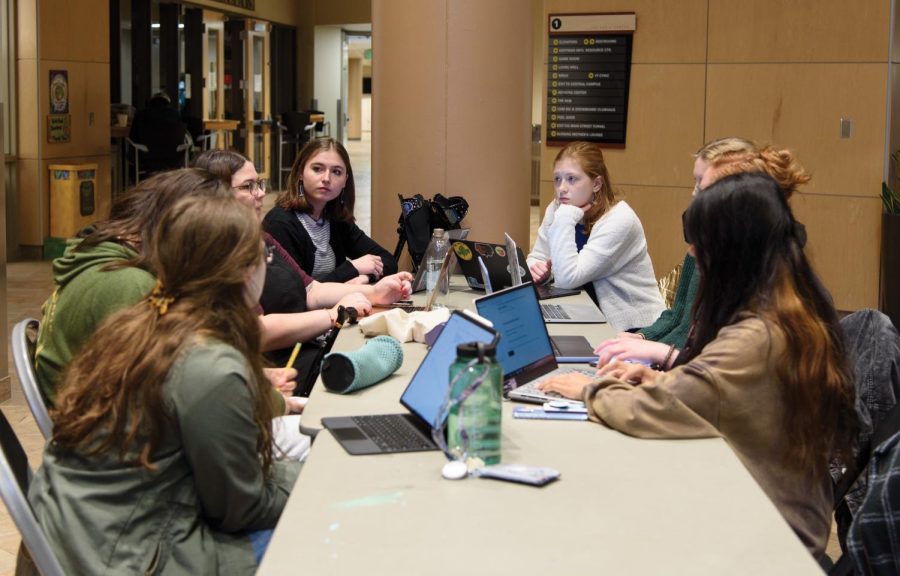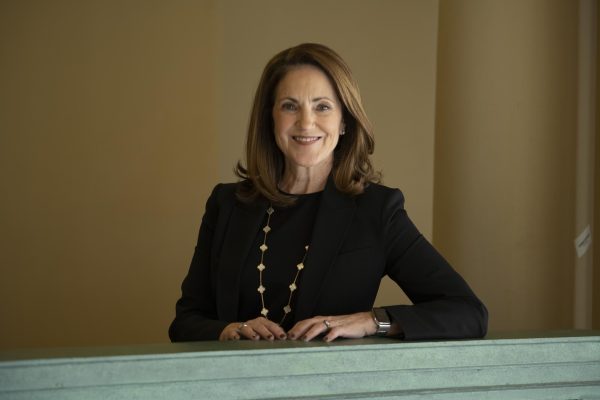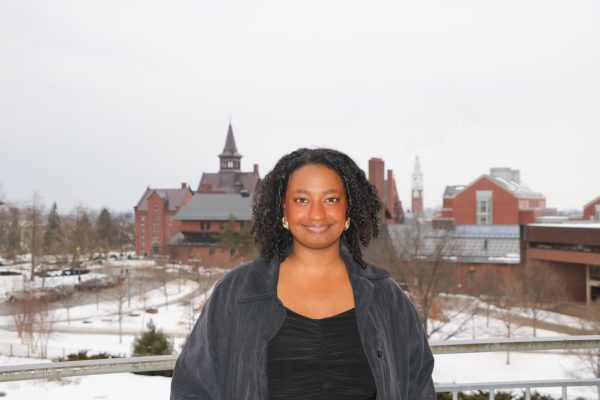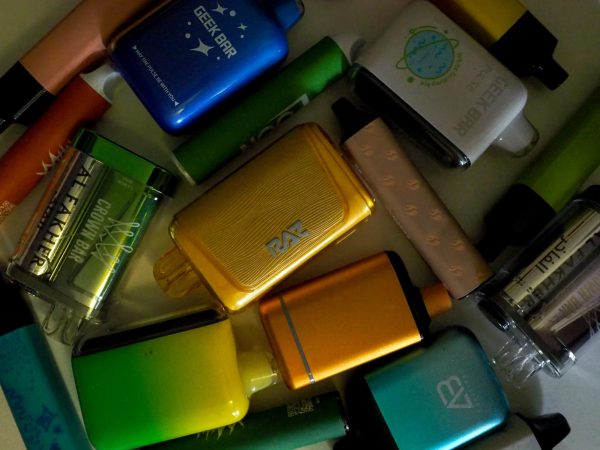New student group pushes for better accessibility on campus
Members of the Disabled Student Union during their board member meeting in the Davis Center Atrium Nov. 13.
A new community group at UVM, the Disabled Student Union, hopes to create a support network and student-led advocacy center for disabled students, said Katie Marshall, undergraduate co-chair of the Disabled Student Union.
Founded Oct. 25 by a group of students in the newly piloted disabled affinity space at Living Well, the group hopes to be a place where people with disabilities can go to find a community that understands issues they face, Marshall said. They want to help hold the University and Student Accessibility Services to the standard of inclusion and accessibility practices they speak of.
“At the core of it, we want to provide an advocacy space for disabled students,” she said. “That’s anyone who is disabled, chronically ill or neurodivergent and identifies with any of those terms. [We want to] provide an advocacy, activism and community space, because disability can be very, very lonely—especially when you think that you’re the only one.”
The DSU hopes to revisit attendance policies as a graded component of classes, address the lack of adequate on-campus housing for students and collaborate with SAS to better the college experiences of disabled students. Attendance policies are disproportionately harmful to disabled students compared to the rest of the student body, Marshall said.
Regarding the lack of accessible housing for disabled students, Trinity campus is a 15-minute walk away from Central campus, and the disabled students who live there find making the trek on a regular basis challenging or undoable, Marshall said.
The DSU also wants to collaborate with SAS to improve the availability of the exam proctoring center, where students with accommodations can take exams in an environment that meets those accommodations, and to collaborate with faculty for better accommodations, Marshall said.
To improve the exam proctoring center, the DSU wants to ensure the scheduling conflicts that disabled students have experienced previously are fixed and that all students have access to the accommodations they require, Marshall said. She hopes to have a more level playing field when it comes to faculty fully accepting much-needed student accommodations.
The DSU has a Google Form linked in their Instagram bio in order to gain a better sense of accessibility issues on campus from those who may not be as comfortable speaking out in a meeting, Marshall said.
“This is set up by students and it is set up for students,” she said. “We are not affiliated with SAS. We are not affiliated with University administration. We are doing this by us and for us.”
The community group is not just for undergraduate students. The DSU also has an advocate for disabled graduate students, said Kiera Malone, graduate student chair of the DSU.
She hopes to be able to work with UVM and the general Burlington community to make the city more accessible for disabled graduate students who may not live on campus, Malone said.
The Burlington public transportation system is unreliable and is a burden on disabled off-campus graduate students without cars, she said.
“You need to have reliable access,” Malone said. “If that access is not good, or if the bus doesn’t show up and stop at every stop, it’s a little bit more difficult as well. We want to make sure that people know about what’s going on.”
She hopes to give greater opportunities to disabled students on campus and help graduate students who are transitioning to an even more independent lifestyle than they had in their undergraduate schooling, Malone said.
“We don’t [usually] live on campus so we don’t run into as many of the accessibility issues that need to be addressed with ResLife,” she said. “But we’re a bit older, we’re going to be turning 26 soon, which means you lose your health insurance. So there’s different issues for different sides of the coin.”
Malone hopes to have an increased level of graduate student involvement to have a larger impact on the UVM campus to be able to have a strong presence in advocacy for their organization, she said.
“If we preach inclusion, we really need to think about including everybody because then you can pull in a lot of other people with different perspectives than what we have currently,” Malone said.
DSU Undergraduate Co-chair Ariel Schuck, a first-year, hopes to see better advocacy and inclusion for those with mobility disabilities, she said.
The CATS Shuttle system, which is supposed to provide accessible buses to the community, lacks available accessibility seating and an adequate number of stops around campus which is exacerbated by the construction occurring on campus, Schuck said.
She wants to advocate for more accessibility surrounding the system, including the additions of benches at CATS Shuttle stops for disabled people, Schuck said.
The DSU provides a space for disabled people to be able to speak to other disabled people about the issues that are occurring and the general struggles that come with being a disabled college student, Schuck said.
“We had a game night awhile back and it was so amazing being able to speak to someone who can say that they understand what I’m going through,” Schuck said.
She wants the DSU to be a place for disabled people to be and feel seen, Schuck said. She hopes it will grow into a community where people can air their grievances and issues without feeling judged and knowing that they are valid.
“I’ve noticed that people will look at me less when I’m using a more visible mobility aid,” Schuck said. “Being disabled can be very isolating.”
SAS aims to strive to be a strong advocate for disabled students at UVM, SAS Program Director Sharon Mone stated in a Nov. 16 email. They are committed to working with each student individually to give them the accommodations they need.
Each accommodation case is held on an individual basis, Mone stated. If a student’s accommodations are not accepted, they have the opportunity to appeal the decision.
In addressing the DSU’s concern on the accessibility of transportation on campus, Mone hopes to collaborate and get a further understanding through speaking with students and peers, she stated.
“My understanding is that all the buses are accessible,” Mone stated. “They drop down so wheelchairs and people can come up, but the designated seating is not enforced and therefore students that should be able to use it are forced to not have it.”
SAS provides a baseline accommodation in which disabled students can be afforded an additional absence in each course beyond what the attendance policy a professor may have in their syllabus, Mone stated. Additional absences can be potentially accommodated through conversation between the student, SAS and the professor of the class.
Regarding accommodation issues with the exam proctoring center, the Office of the Provost has allotted some additional space for the spring semester which should eliminate all scheduling issues, Mone stated.
SAS remains dedicated to holding faculty, staff and the campus community in collaboration with disabled students to ensure that they have the accessibility options they need, Mone stated. She encourages students who are having difficulties to contact SAS via their website, phone number or email.
“If the specialist that they’ve been assigned to doesn’t seem to be a good fit with them, we will absolutely always move them to a different specialist,” Mone stated. “I will meet with that student to find out what was going on.”
The DSU is currently holding general meetings, the dates of which can be found on their Instagram as they are announced, Marshall said. In order to be as accessible as they can, the DSU offers both online and in-person attendance opportunities, as well as meeting notes to those who are interested.










